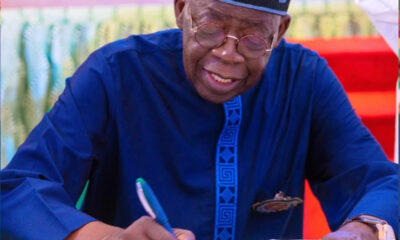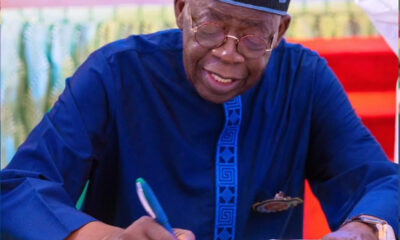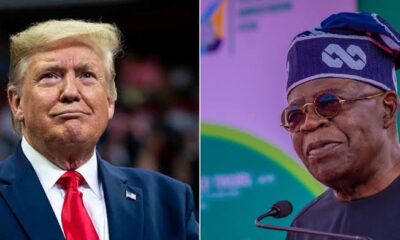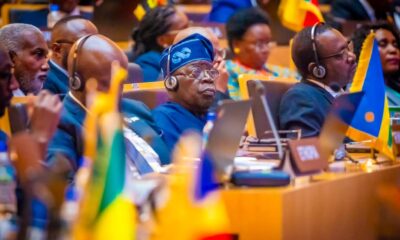The Nation
Trump’s Foreign Aid Freeze: Nigeria on verge of missing out on US $1bn annual receipt
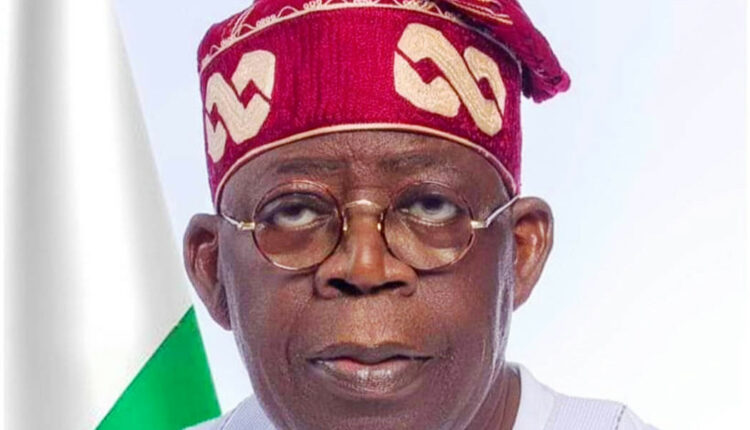
The recent decision by U.S. President Donald Trump to suspend foreign aid to most countries excluding Israel and Egypt has sent shockwaves across the global aid community, particularly in Africa.
With Nigeria being one of the top recipients of U.S. foreign assistance, the 90-day freeze could significantly impact humanitarian programs, healthcare, and economic initiatives in the country.
What Led to the Aid Suspension?
The aid suspension aligns with Trump’s long-standing “America First” policy, which prioritizes domestic interests. The U.S. State Department and the United States Agency for International Development (USAID) were ordered to halt aid programs while reviewing their alignment with Trump’s foreign policy goals.
In a statement, U.S. Secretary of State Marco Rubio emphasized the need to justify every dollar spent by answering three key questions:
1. Does it make America safer?
2. Does it make America stronger?
3. Does it make America more prosperous?
Trump also argued that the foreign aid system is “not aligned with American interests” and often contradicts U.S. values. However, funding for HIV/AIDS, malaria, and other life-threatening diseases was exempted from the freeze.
Impact on Nigeria: Humanitarian and Economic Challenges
Nigeria heavily depends on U.S. foreign aid, especially for healthcare, security, and humanitarian relief. The country received nearly $6 billion in aid between 2019 and 2024, averaging $1 billion annually. In 2023 alone, the U.S. allocated over $597.6 million to emergency responses in Nigeria, with major funding areas including:
HIV/AIDS programs – $547.6 million
Maternal and child health – $150.75 million
Basic health services – $219.34 million
Agriculture – $50.43 million
Water supply and sanitation – $24.20 million
Basic education – $23.42 million
A Looming Humanitarian Crisis
The U.S. aid freeze comes at a time when Nigeria is already facing serious humanitarian challenges. According to a 2024 Humanitarian Action report, 7.9 million people in Borno, Adamawa, and Yobe states require urgent assistance, with an estimated $926.5 million needed to address the crisis.
However, even before the aid suspension, Nigeria had a funding shortfall—of the $1.3 billion requested for humanitarian relief in 2023, only 37% ($479.8 million) was received. The suspension could further weaken relief efforts, especially in conflict-affected regions where Boko Haram insurgency, farmer-herder clashes, and communal violence continue to displace millions.
NGOs and Health Programs in Crisis
Despite claims that HIV/AIDS funding is exempt, many NGOs working in HIV/AIDS programs have reported indefinite closures due to lack of funding. Sources reveal that major organizations like Pop Council, Heartland Alliance Nigeria, and Caritas Nigeria have begun laying off staff.
Chioma Kanu, Executive Director of Mothers and Marginalized Advocacy Centre (MAMA Centre), expressed concern over the situation:
“Many HIV/AIDS patients may now have to buy antiretroviral drugs themselves, which are very expensive. We could see a rise in deaths before the 90-day period ends.”
Similarly, a project funding application approved under Strengthening Civic Advocacy and Local Engagement (SCALE) was canceled in December 2024 due to the suspension, leaving many NGOs in financial limbo.
Economic and Budgetary Impact
Experts warn that the aid freeze could strain Nigeria’s budget as the government may have to redirect funds from other sectors to cover aid-assisted programs.
Funmi Adebowale, Head of Research at Parthian Partners, highlighted that the suspension could disrupt key sectors like healthcare, security training, education, and infrastructure.
David Adonri, Vice Chairman of Highcap Securities, described the suspension as a “shock therapy” that could push Nigeria towards self-sufficiency rather than relying on foreign aid.
Olatunde Amolegbe, CEO of Arthur Stephen Asset Management (ASAM), suggested that private sector partners might need to fill the funding gap left by the U.S.
A Call for Nigeria to Rethink Its Dependency
Some analysts argue that the aid freeze could serve as a wake-up call for Nigeria to reduce dependency on foreign assistance and focus on better resource management.
Minister of State for Health and Social Welfare, Dr. Iziaq Adekunle Salako, remarked:
“This is a wake-up call for Nigeria to rethink our strategies, exert ourselves, and work toward a more self-sufficient healthcare system.”
Prof. Babatunde Ayeleru, CEO of French Village, echoed similar sentiments:
“Nigeria has enough natural and human resources to be self-sufficient. If we keep begging for aid, we subject ourselves to a form of economic slavery.”
Conclusion: A Turning Point for Nigeria?
While the 90-day foreign aid freeze could exacerbate Nigeria’s humanitarian and economic challenges, it also presents an opportunity for the government to reassess its spending priorities, combat corruption, and strengthen domestic funding mechanisms.
The long-term impact will depend on whether Nigeria can successfully transition from aid reliance to self-sufficiency or if it will struggle to bridge the gap left by U.S. funding cuts.


